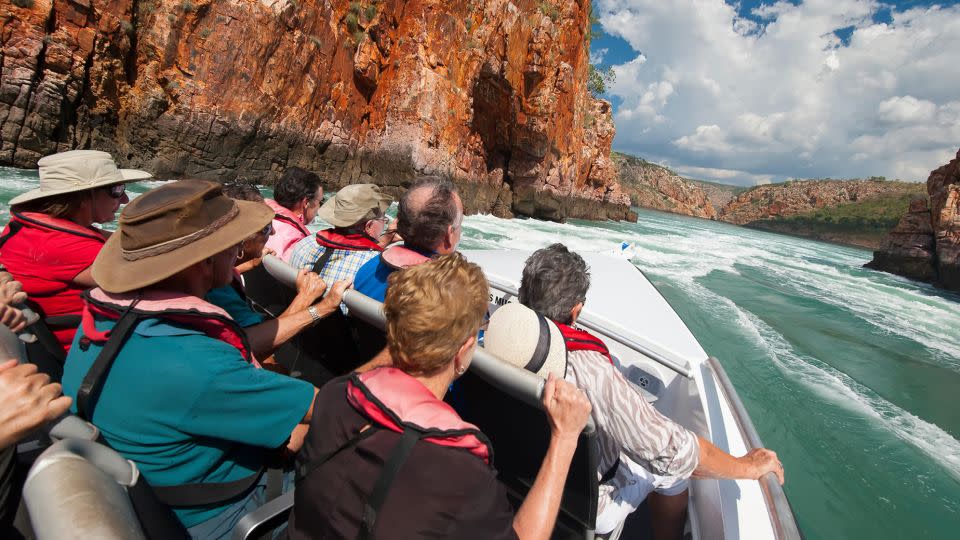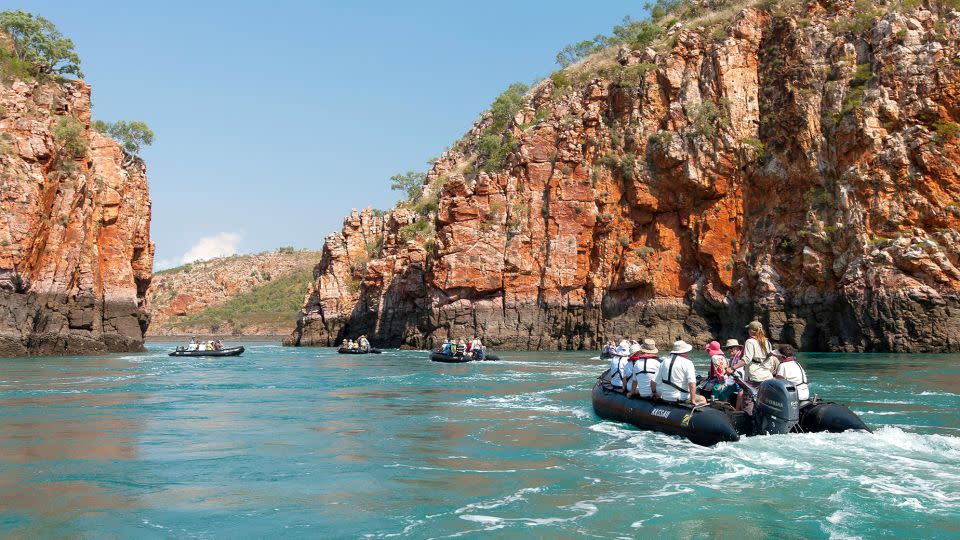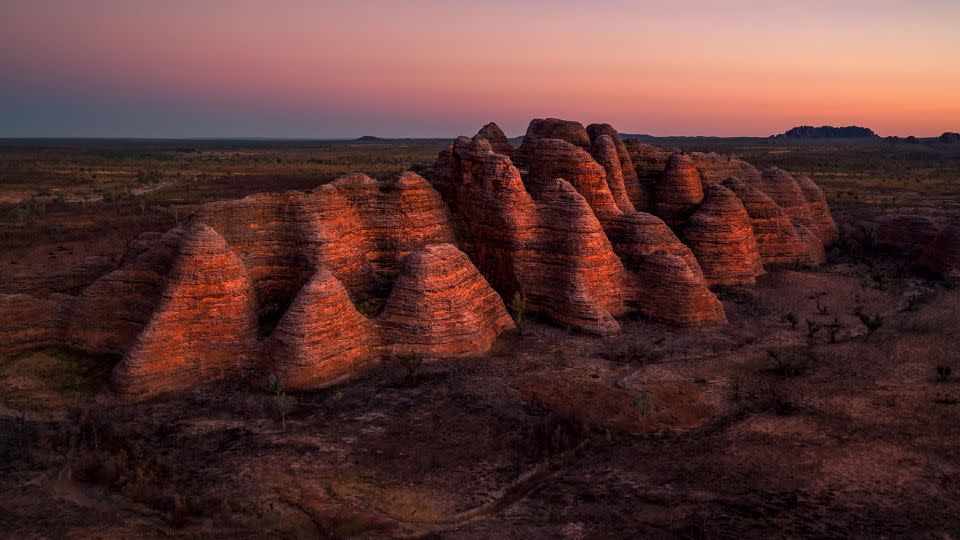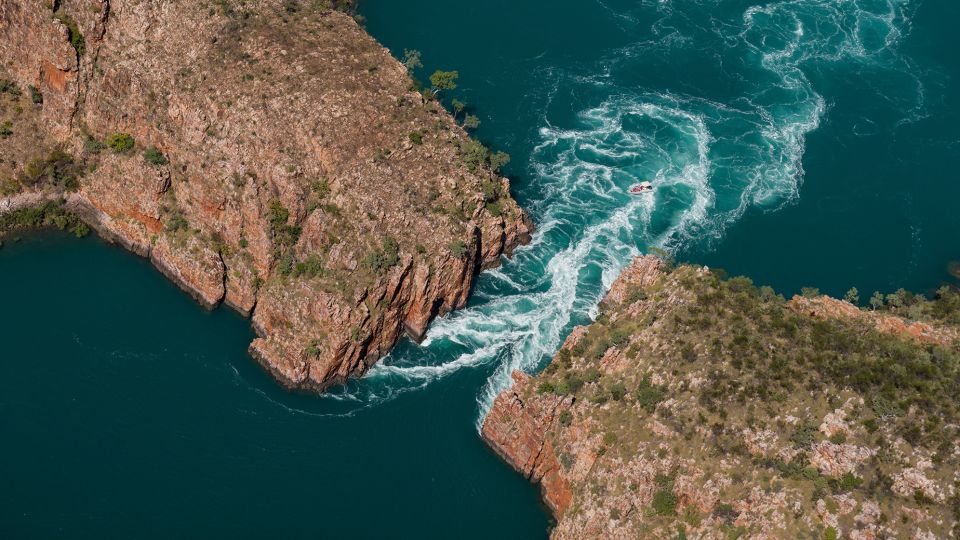But all that is about to change.
Located at Talbot Bay, a remote spot on the country’s northwestern coastline, the falls are created when surges of seawater pour between two narrow cliff gaps, creating a swell of up to four meters that resembles a waterfall.
For decades, tours have pierced these gaps on powerful boats, much to the dismay of the area’s Indigenous Traditional Owners, who say the site is sacred.
It’s not the only reason the boat tours are controversial. In May 2022 one boat hit the rocks resulting in passenger injuries and triggering a major rescue operation. The incident led to calls to halt the tours for safety reasons.
Although the boat trips have continued, the concerns of the Indigenous Traditional Owners have now been heeded, with Western Australia, the state in which the falls are situated, saying they will be banned in 2028 out of respect.
Close-up views still permitted

Not everyone is happy with the move. The WA Tourism Council, which represents tourism businesses in the state, has warned it will deter visitors and cause major job losses.
But it’s been welcomed by the Dambeemangaddee people, who’ve inhabited this area for 56,000 years and believe boats desecrate the falls.
Located in the Kimberley Region, 1,900 kilometers (1,180 miles) north of the state capital Perth, the Horizontal Falls are within Maiyalam, one of three protected marine parks created in 2022 that were co-designed, and now co-managed, by Traditional Owners and the WA Government.
The move by the Western Australian government comes amid criticism over its commitment to protecting Indigenous sites in a state that relies heavily on mining.
Talbot Bay’s main boat tour operator, Horizontal Falls Seaplane Adventures, will cease traversing the falls in March 2028, with all other operators to stop by the end of 2026.
After the ban takes effect, boats will still be allowed to cruise Talbot Bay, offering visitors a close-up view of the cascading spectacle that British naturalist David Attenborough has called “Australia’s most unusual natural attraction.”
“This decision reflects the government’s dual responsibilities to respect the cultural views of Traditional Owners and the need to protect and support WA’s tourism industry,” said WA Environment Minister Reece Whitby in a statement.
“We want people to experience Indigenous culture as an essential, vibrant part of visiting jointly managed national and marine parks across Western Australia.”
The Dambeemangaddee are among dozens of Indigenous peoples who inhabited WA for more than 50,000 years before Australia was violently colonized by the British in the 1780s. Countless parcels of Indigenous-controlled land were then seized or defiled.
‘Respect the power of this place’


The Horizontal Falls ban aims to restore the sanctity of this site. According to local Indigenous beliefs, boats that pierce these gaps disturb Woongudd, the mystical serpent who created this wonder.
Woongudd’s story features in the Dreamtime, an ancient collection of tales and principles that have defined Australian Aboriginal culture. The rushing tide at the falls is said to be caused by Woongudd gliding between the cliffs.
Since the 1990s, Traditional Owners have expressed concerns that boat tours are damaging this “powerful, sacred place,” the Dambeemangaddee said in a group statement, responding to the ban.
“This has been an emotionally trying journey for many of us,” they wrote. “With this decision, we finally feel we have been heard. Our ancestors lived there all year round, and we still feel their presence. It is a quiet, calm place. But it can be dangerous. Culturally, Traditional Owners would only travel through the (cliff) gaps for a specific purpose and always at the right time.”
The Dambeemangaddee emphasized they hope tourists continue to visit the Horizontal Falls. They believe tourists can be dazzled by its tidal forces while maintaining a polite distance.
“Respect the power of this place, and our cultural obligations to care for Country and keep you safe,” they asked of visitors, referring to their ancient role as custodians of Australia’s landscape.
In preparation for the Horizontal Falls ban, the Dambeemangaddee stated they have begun creating new videos and brochures that will explain their culture and spiritual connection to Talbot Bay. They also are creating fresh tours, welcome ceremonies, and a visitor management plan for the location.
Critics fear ban will reduce visitor numbers


Horizontal Falls Seaplane Adventures said in a statement it will transition to a “culturally appropriate program that will allow visitors to experience the spectacular natural wonder of the Horizontal Falls in a respectful context”.
The falls boat ban was criticized by Tourism Council WA CEO Evan Hall, who said this activity had long attracted visitors to the Kimberley. He added that banning it would impact 15 tourism operators, and cause the estimated loss of 58 full-time jobs in the region.
“By traversing the falls, visitors experience the awesome nature of this unique environment,” Hall said in a statement earlier this month.
“It’s not something that can be experienced from the sideline. National Parks are public land and waters that belong to everyone. The legislative objective of National Parks includes promoting and facilitating nature-based tourism and public recreation – this is not achieved by restricting visitor access.”
However, the ban was supported by Kimberley Day Cruise CEO Sally Shaw, who told CNN the company’s Horizontal Falls tours only venture near, not between these cliff gaps. She says piercing the falls is both dangerous and disrespectful to its Traditional Owners.
“We do not traverse the falls because of safety and cultural reasons and have never done this on our tour,” Shaw said.
“Most people who do these tours have cultural understanding and recognize the future is a sustainable national treasure we can all appreciate in safety.”
For more CNN news and newsletters create an account at CNN.com
